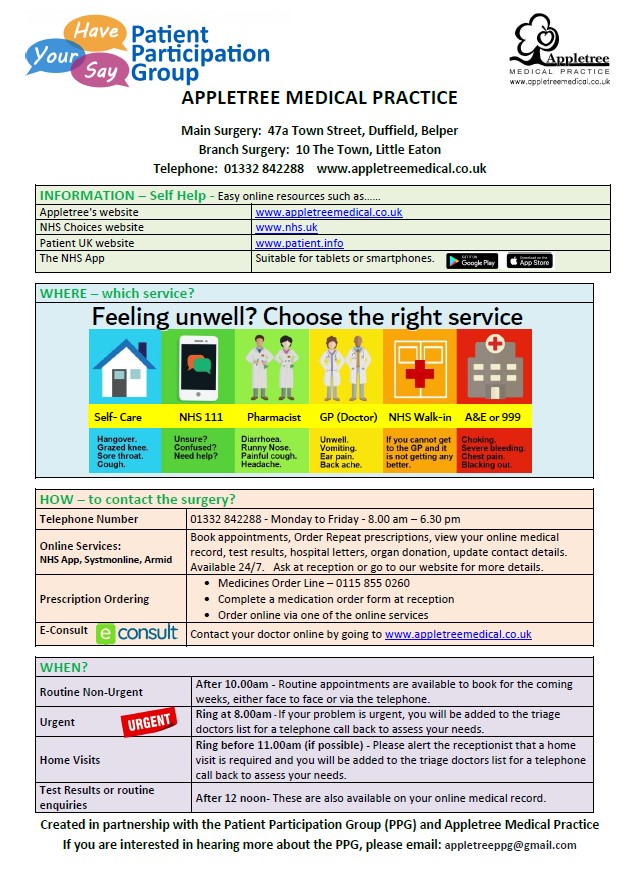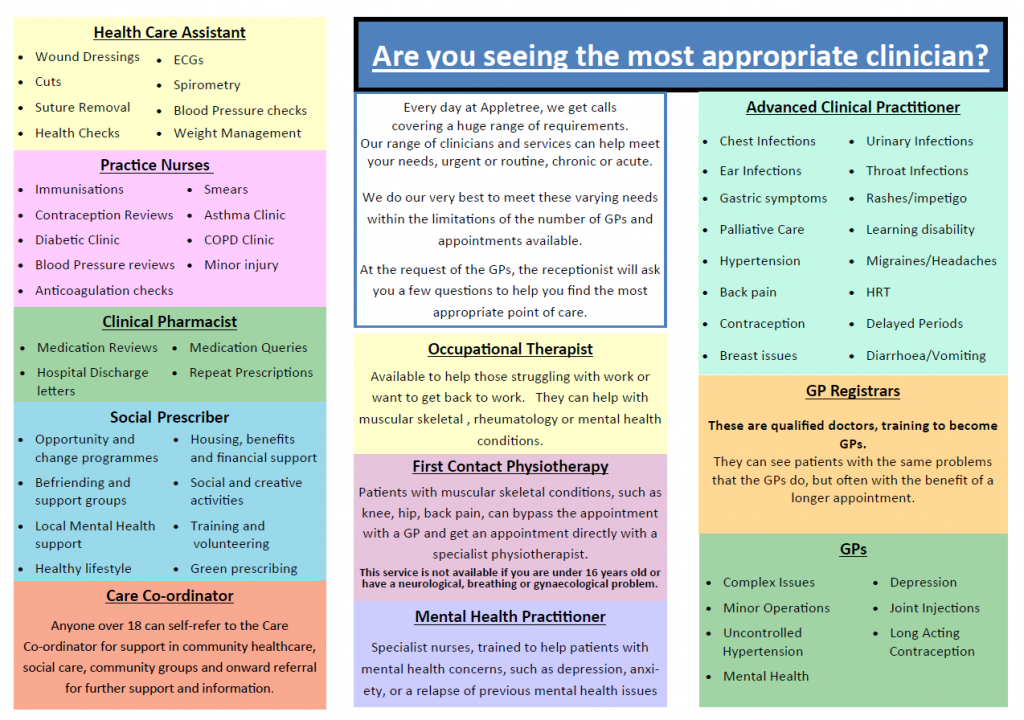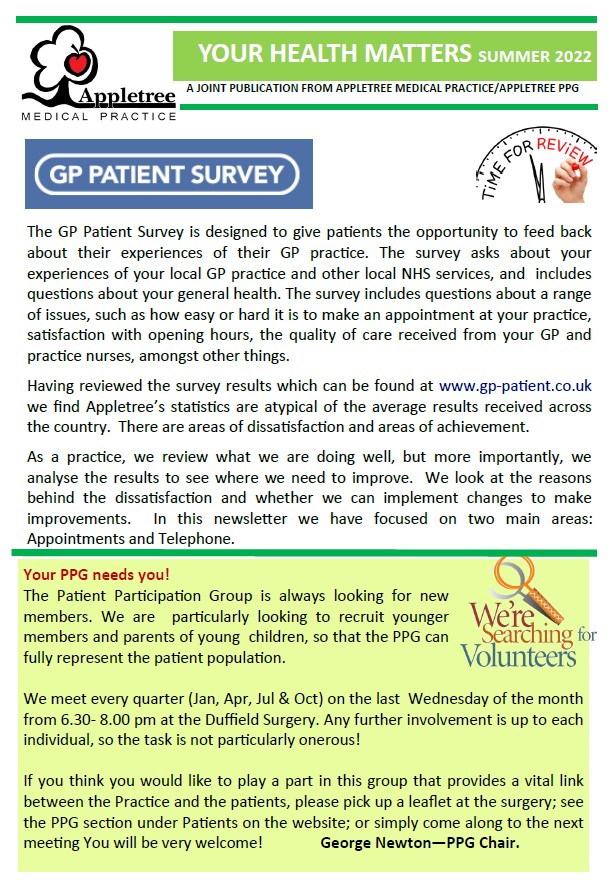We are acutely aware that patients are currently frustrated with trying to get an appointment with a GP. We thought we would try and explain some of the issues that we are currently facing.
Currently we have approximately 11,100 patients and we offer around 700 appointments per week with a clinician, i.e. a doctor, Nurse Practitioner or Pharmacist. We offer a further 300 appointments with a practice nurse/HCA. Each day the demands for appointments far exceeds the number of appointments we can offer, so we need to manage these appointments carefully.
We are reviewing the number of face-to-face appointments vs telephone appointments that we offer on a weekly basis. However, patient/practice staff safety, as well as a clinical need, means that patient preference cannot always be offered.
Why aren’t you offering more face-to-face appointments?
There are many reasons why we are currently restricting the number of face-to-face appointments we offer:
- We are trying to reduce risk. Many patients who telephone the surgery have a cough or fever etc. which are possible indicators of Covid-19. Cases of Covid-19 are currently high, and we need to protect vulnerable patients visiting the surgery as well as staff members. We have been following NHS England guidance to telephone triage patients first, which enables us to reduce this risk. If, having spoken to a patient, a clinician feels that it is appropriate to see you face-to-face, they will book you in accordingly. Also, many problems can be dealt with effectively over the telephone.
- We have a finite number of appointments and by telephone triaging, we can prioritise patients accordingly, ensuring those with the most urgent clinical need can still be seen face-to-face if clinically necessary.
- We have made available a number of pre-bookable face-to-face routine appointments for patients to book directly without the need for telephone triage. This is due to some ailments automatically requiring an examination, so receptionist can advise if they feel this appropriate.
- Although isolation guidance has been relaxed for most of society, healthcare workers are still following strict isolation procedures. This means that if a member of staff has someone in their household who tests positive for Covid-19, that member of staff must work from home for up to 10 days. If this is a clinician, this has an impact on the number of patients that can be seen face-to-face.
- This has a knock-on effect for reception staff who are not only trying to answer incoming calls but are also rearranging pre-booked appointments, often at short notice. To reduce this additional workload, the booking of future routine appointments is restricted to ensure unnecessary rearranging.
- GP surgeries are required to ensure strict infection control procedures are followed. Consulting and treatment rooms need to be deep cleaned up to twice daily and all surfaces wiped down in between each patient as well as a change of PPE. This all takes additional time and resources.
- We do also have to remember that many patients prefer a telephone call rather than a face-to-face appointment as they are often at work or it fits in with their lifestyle.
Why are the telephone lines so busy?
We recognise that the phone lines are extremely busy, which demonstrates how much pressure the receptionists are currently under. Please be patient and kind; they are working tremendously hard and they are working to the instructions of the GPs.
Some of the reasons why the phones are busy are:
- Patient enquiries regarding covid-19 vaccinations and the covid-passport. Each day we receive many calls relating to when patients will receive vaccine appointments or how to access the NHS app.
- Additional enquiries regarding hospital waiting lists due to delays in operations. These patients are requiring additional GP help, care and appointments.
- Every time the news/papers/social media report any sort of health-related story, patients ring their GP surgeries for advice and guidance. Over the last 18 months there has been a lot of media regarding the pandemic, which subsequently increases telephone traffic. For example:
- Patients needing a covid passport to travel.
- Covid Booster vaccination eligibility
- The relaxing of isolation guidance
- Do I need a PCR test?
- There has been a national blood bottle shortage. Patients have been contacting the surgery asking if their blood test is urgent or when they can get a blood test appointment. Many appointments have been cancelled as a result; all of this requires receptionist time.
- Many calls to the surgery are generally taking longer to deal with. There is an unprecedented demand for appointments and it takes time explaining the reasons why there are no appointments left that day, or that you will need to ring back at 8am the following day. Prior to booking an appointment, receptionists are also required to ask covid-19 related questions.
The phone lines are under regular review and we have recently increased the number of lines into the practice to help meet demand. We have also moved over to the Medicines Order line (MOL) for repeat prescription requests. This will hopefully reduce the amount of phone calls coming into the practice.
Why don’t you get more staff?
If only it was that easy:
Clinical staff
The setting up of the vaccination hub at the beginning of this year is having a massive impact on our staffing levels. Whilst we have been very fortunate to secure a large number of volunteers, along with the 3 other surgeries involved, we have had to supply our share of GPs, Nurses and administration staff to help deliver the vaccination programme. This will continue through to Christmas as we administer the flu and covid-19 booster vaccines. If clinicians are working at the hub, this obviously has an impact on the number of appointments we can offer at the surgery.
We have desperately tried to get some locum cover to help ease the pressure, but unfortunately, there is a national shortage of GPs. We have managed to secure one locum GP for half a day per week until Christmas. We have also secured a second locum GP for one day per week during November and December. Although this is still a shortfall of what we require, it goes a little way in bolstering the appointment availability.
Reception Staff
The role of a receptionist is a complex one. It takes approximately 8 weeks of intensive training to become a receptionist, and a further 6 months before they feel confident enough to be able to deal with the majority of queries that come in on any given day, so recruiting temporary staff is not an option.
Over the last year, we have increased the number of receptionists answering the telephone at any one time. We have employed a couple of members of staff to help out with ringing patients who do not have a mobile phone (and therefore no text facility) to invite them for the flu/covid/booster vaccines. We have also recently employed an apprentice to help support the reception team.
How you can help us!
I hope that this goes some way to explaining the challenging circumstances our staff are currently facing. Please show respect to all staff and treat them with kindness. Although it might look like our waiting room has very few patients sitting in it, this is to protect you and your loved ones. Whether it is our clinical staff, our receptionists or our administration team, we are all working extremely hard and we are all incredibly proud to be working for the NHS.
Thank you








